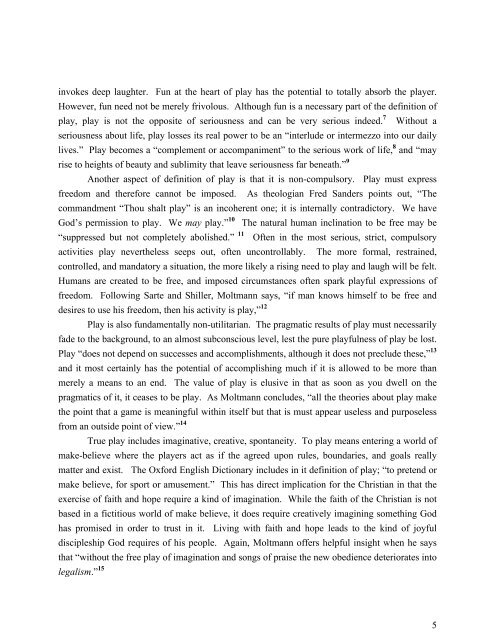Created to Play: Thoughts on Play, Sport, and the Christian Life
Created to Play: Thoughts on Play, Sport, and the Christian Life
Created to Play: Thoughts on Play, Sport, and the Christian Life
Create successful ePaper yourself
Turn your PDF publications into a flip-book with our unique Google optimized e-Paper software.
invokes deep laughter. Fun at <strong>the</strong> heart of play has <strong>the</strong> potential <str<strong>on</strong>g>to</str<strong>on</strong>g> <str<strong>on</strong>g>to</str<strong>on</strong>g>tally absorb <strong>the</strong> player.<br />
However, fun need not be merely frivolous. Although fun is a necessary part of <strong>the</strong> definiti<strong>on</strong> of<br />
play, play is not <strong>the</strong> opposite of seriousness <strong>and</strong> can be very serious indeed. 7 Without a<br />
seriousness about life, play losses its real power <str<strong>on</strong>g>to</str<strong>on</strong>g> be an “interlude or intermezzo in<str<strong>on</strong>g>to</str<strong>on</strong>g> our daily<br />
lives.” <str<strong>on</strong>g>Play</str<strong>on</strong>g> becomes a “complement or accompaniment” <str<strong>on</strong>g>to</str<strong>on</strong>g> <strong>the</strong> serious work of life, 8 <strong>and</strong> “may<br />
rise <str<strong>on</strong>g>to</str<strong>on</strong>g> heights of beauty <strong>and</strong> sublimity that leave seriousness far beneath.” 9<br />
Ano<strong>the</strong>r aspect of definiti<strong>on</strong> of play is that it is n<strong>on</strong>-compulsory. <str<strong>on</strong>g>Play</str<strong>on</strong>g> must express<br />
freedom <strong>and</strong> <strong>the</strong>refore cannot be imposed. As <strong>the</strong>ologian Fred S<strong>and</strong>ers points out, “The<br />
comm<strong>and</strong>ment “Thou shalt play” is an incoherent <strong>on</strong>e; it is internally c<strong>on</strong>tradic<str<strong>on</strong>g>to</str<strong>on</strong>g>ry. We have<br />
God’s permissi<strong>on</strong> <str<strong>on</strong>g>to</str<strong>on</strong>g> play. We may play.” 10 The natural human inclinati<strong>on</strong> <str<strong>on</strong>g>to</str<strong>on</strong>g> be free may be<br />
“suppressed but not completely abolished.” 11 Often in <strong>the</strong> most serious, strict, compulsory<br />
activities play never<strong>the</strong>less seeps out, often unc<strong>on</strong>trollably. The more formal, restrained,<br />
c<strong>on</strong>trolled, <strong>and</strong> m<strong>and</strong>a<str<strong>on</strong>g>to</str<strong>on</strong>g>ry a situati<strong>on</strong>, <strong>the</strong> more likely a rising need <str<strong>on</strong>g>to</str<strong>on</strong>g> play <strong>and</strong> laugh will be felt.<br />
Humans are created <str<strong>on</strong>g>to</str<strong>on</strong>g> be free, <strong>and</strong> imposed circumstances often spark playful expressi<strong>on</strong>s of<br />
freedom. Following Sarte <strong>and</strong> Shiller, Moltmann says, “if man knows himself <str<strong>on</strong>g>to</str<strong>on</strong>g> be free <strong>and</strong><br />
desires <str<strong>on</strong>g>to</str<strong>on</strong>g> use his freedom, <strong>the</strong>n his activity is play,” 12<br />
<str<strong>on</strong>g>Play</str<strong>on</strong>g> is also fundamentally n<strong>on</strong>-utilitarian. The pragmatic results of play must necessarily<br />
fade <str<strong>on</strong>g>to</str<strong>on</strong>g> <strong>the</strong> background, <str<strong>on</strong>g>to</str<strong>on</strong>g> an almost subc<strong>on</strong>scious level, lest <strong>the</strong> pure playfulness of play be lost.<br />
<str<strong>on</strong>g>Play</str<strong>on</strong>g> “does not depend <strong>on</strong> successes <strong>and</strong> accomplishments, although it does not preclude <strong>the</strong>se,” 13<br />
<strong>and</strong> it most certainly has <strong>the</strong> potential of accomplishing much if it is allowed <str<strong>on</strong>g>to</str<strong>on</strong>g> be more than<br />
merely a means <str<strong>on</strong>g>to</str<strong>on</strong>g> an end. The value of play is elusive in that as so<strong>on</strong> as you dwell <strong>on</strong> <strong>the</strong><br />
pragmatics of it, it ceases <str<strong>on</strong>g>to</str<strong>on</strong>g> be play. As Moltmann c<strong>on</strong>cludes, “all <strong>the</strong> <strong>the</strong>ories about play make<br />
<strong>the</strong> point that a game is meaningful within itself but that is must appear useless <strong>and</strong> purposeless<br />
from an outside point of view.” 14<br />
True play includes imaginative, creative, sp<strong>on</strong>taneity. To play means entering a world of<br />
make-believe where <strong>the</strong> players act as if <strong>the</strong> agreed up<strong>on</strong> rules, boundaries, <strong>and</strong> goals really<br />
matter <strong>and</strong> exist. The Oxford English Dicti<strong>on</strong>ary includes in it definiti<strong>on</strong> of play; “<str<strong>on</strong>g>to</str<strong>on</strong>g> pretend or<br />
make believe, for sport or amusement.” This has direct implicati<strong>on</strong> for <strong>the</strong> <strong>Christian</strong> in that <strong>the</strong><br />
exercise of faith <strong>and</strong> hope require a kind of imaginati<strong>on</strong>. While <strong>the</strong> faith of <strong>the</strong> <strong>Christian</strong> is not<br />
based in a fictitious world of make believe, it does require creatively imagining something God<br />
has promised in order <str<strong>on</strong>g>to</str<strong>on</strong>g> trust in it. Living with faith <strong>and</strong> hope leads <str<strong>on</strong>g>to</str<strong>on</strong>g> <strong>the</strong> kind of joyful<br />
discipleship God requires of his people. Again, Moltmann offers helpful insight when he says<br />
that “without <strong>the</strong> free play of imaginati<strong>on</strong> <strong>and</strong> s<strong>on</strong>gs of praise <strong>the</strong> new obedience deteriorates in<str<strong>on</strong>g>to</str<strong>on</strong>g><br />
legalism.” 15<br />
5


